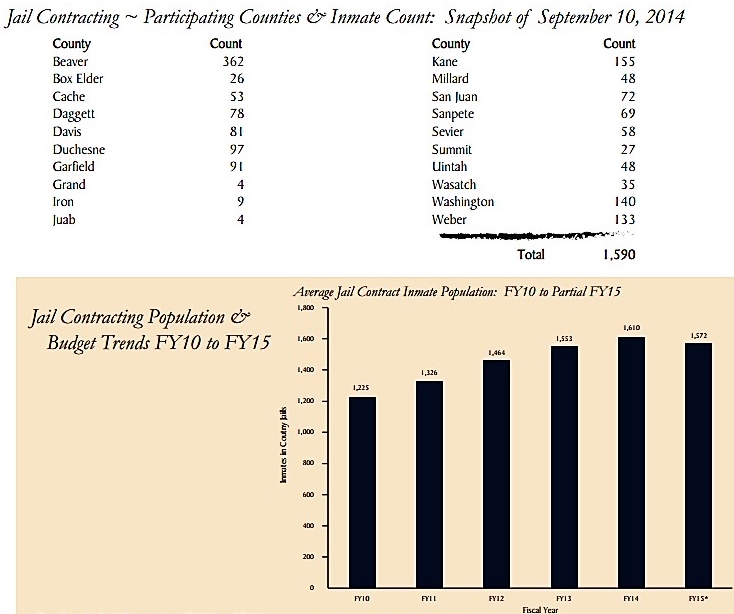Jail Contracting is a program used to manage the state inmate population in county jails in addition to direct management of inmates in state facilities. The program provides inmate housing to the State prison system through contracts with individual county jails. The counties provide security, supervision, food and other services on a per day cost basis. With Jail Contracting, the department houses state inmates at local jails rather than in state-owned facilities. In this way, the Jail Contracting program helps the state reduce its own facilities costs, and helps local governments offset their own costs by filling their excess capacity in local jails.
During the 2015 General Session, the Legislature appropriated for Fiscal Year 2016, $33,694,200 from all sources for Jail Contracting. This is a 1.3 percent reduction from Fiscal Year 2015 revised estimated amounts from all sources. The total includes $33,644,200 from the General/Education Funds, an increase of 6 percent from revised Fiscal Year 2015 estimates.
In addition to statewide compensation and internal service fund cost increases, the following appropriation adjustments were made during the 2015 General Session:
The Department submits the following information for treatment outcomes among state inmates housed at the Beaver County Jail.


Each fiscal year, a new "average state daily incarceration rate" for jail programs as defined in 64-13e-102 of the Utah State Code, is determined by the Department of Corrections. This is reviewed with the Utah Sheriff's Association, local elected officials, the Commission on Criminal and Juvenile Justice (CCJJ), and the Governor's Office of Planning and Budget (GOPB). The rate is based on operating costs reported by the counties to Corrections for the previous calendar year. The rate is based on operating costs reported by the counties to Corrections for the previous calendar year. Upon review of the "average state daily incarceration rate" the Legislature designates a "final state daily incarceration rate" of which 73% is calculated to be the jail contracting rate (or 79% if the jail provides treatment to the offender).
This "final state daily incarceration rate" is used for both Jail Reimbursement and Jail Contracting. Any additional funds not expended for contracting state inmates to county facilities is used for medical costs incurred by the counties.
COBI contains unaudited data as presented to the Legislature by state agencies at the time of publication. For audited financial data see the State of Utah's Comprehensive Annual Financial Reports.